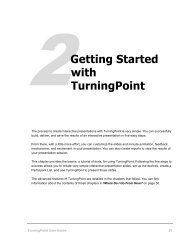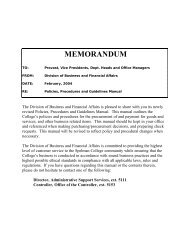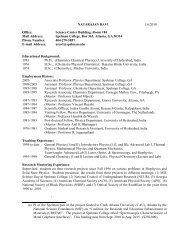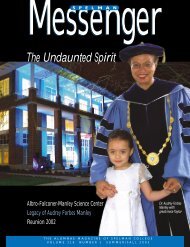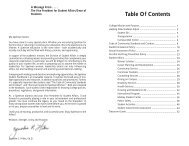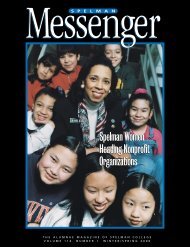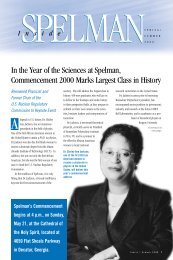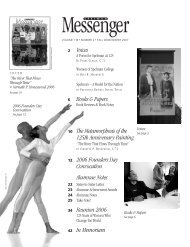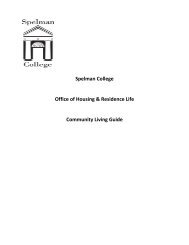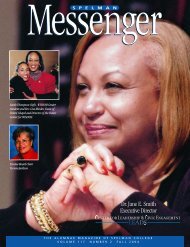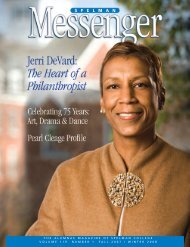MessengerF E A T U R ESPELMAN WOMEN HEADINGNONPROFIT ORGANIZATIONSPhilanthropic Service Borne Out of a Rich HistoryB Y B ARBARA B UCKLEY W ASHINGTOM, C’72Jane Smith, C’68, President/CEO of the National Council ofNegro Women.Jane Smith, C’68 (center)as a <strong>Spelman</strong> freshmanclass officer.10The very foundation of <strong>Spelman</strong> <strong>College</strong> is reflectiveof a call to service, initially enacted by SophiaPackard and Harriet Giles, missionaries from NewEngland who, on April 11, 1881, started a schoolfor black women in the basement of Atlanta's FriendshipBaptist Church. In fact, the first student body included 11women and girls, just out of slavery, eager to learn the skillsthat would help them take advantage of opportunities tolearn to read and write for self-improvement and service.Today, <strong>Spelman</strong> women continue to labor in the worldof nonprofit organizations as they bring to society a moreefficient, generous and well-targeted allocation ofresources to those they serve. They work tirelessly, poweredby the same convictions expressed by MotherTeresa when she accepted the 1997 <strong>No</strong>bel Peace Prize:At the end of life we will not be judged by howmany diplomas we have received, how muchmoney we have made, how many great things wehave done.We will be judged by “I was hungry and yougave me something to eat, I was naked and youclothed me, I was homeless and you took me in.”Hungry, not only for bread — but hungry forlove. Naked, not only for clothing — but naked forhuman dignity and respect. <strong>Home</strong>less, not only forwant of a room of bricks — buthomeless because of rejection.Dr. Jane E. Smith, C’68Dr. Jane E. Smith had always expectedto attend <strong>Spelman</strong>. She chose it becauseshe knew the exposure to scholars, leadersand inspirational speakers woulddevelop her own leadership skills.“When I went to <strong>Spelman</strong> I was interestedin national leadership models,” said Dr. Smith, thefirst appointed president and CEO of the National Councilfor Negro Women (NCNW) in Washington, D.C. “And <strong>Spelman</strong>didn't fail. From my first day there to my last day, therewere so many people that I had the opportunity to see.”In her early activist days at <strong>Spelman</strong> , she remembersjoining seven other classmates in forming Sisters in Blackness.While at <strong>Spelman</strong>, Dr. Smith won the Whitney Youngand Woodrow Wilson Fellowships and served as assistant tothe <strong>College</strong>’s president, Donald M. Stewart. She earned hermaster’s degree in sociology from Emory and her doctorateof education in social policy analysis from Harvard.“I was pleased to be part of that group (Sisters in Blackness)because we dealt with far-reaching issues that affectedAfrican Americans, both in the United States and around theworld,” she said. “I knew that <strong>Spelman</strong> could prepare mefor leadership better than any other environment. There wasno competition from gender or race. You could be anythingyou wanted to be.”Her leadership abilities attracted the attention of organizationslike INROADS, a career development organizationfor minority students, where she became the first managingdirector of the Atlanta and Detroit affiliates; the MartinLuther King Center for <strong>No</strong>nviolent Social Change, where shebecame development director; and the Carter Center, whereshe served as director of the Atlanta Project. Her appointmentin 1998 to her current post at the NCNW — a multifaceted,community-based international organization witha potential outreach of more than four million women —is a natural outgrowth of her stature as an accomplishedleader in the nonprofit arena.“The major issues facing NCNW in the past dealt withbasic rights and access,” said Dr. Smith. “Although there aresome of those issues today, they are more subtle. And indealing with them, we have to be more conscious aboutmeasuring and evaluating our outcomes. It is no longerenough just to do the right thing.”Like Dr. Smith, many <strong>Spelman</strong> alumnae have beendrawn to careers in nonprofit organizations, where they areS P E L M A N M E S S E N G E R
esponsible for defining goals and adhering to an organization’smission; recruiting and retaining high-quality staffmembers, volunteers and board members; implementingfundraising drives; and developing and evaluating programs.Most were attracted to <strong>Spelman</strong> because they felt theenvironment was conducive to individual empowermentand development of their leadership skills. Indeed, themajority of these nonprofit leaders were activists on campus,serving as SGA presidents, yearbook editors, class presidents,campus organization founders, Glee Club membersand community volunteers.Dr. Herschelle Sullivan Challenor, C’61“Although going to <strong>Spelman</strong> was a continuation of a familytradition,” said Herschelle Sullivan Challenor, whosemother and four aunts attended the institution, “I alsoknew I could do things there that I wouldn’t have been ableto do at other schools.”At <strong>Spelman</strong>, Dr. Challenor, who grew up in Pittsburgh,was president of the Student Government Association. Todayshe heads the department of International Affairs andDevelopment at Clark Atlanta University, a post she tookafter having served as director of the United Nations Educational,Scientific and Cultural Organization (UNESCO).A pioneer with more than 40 years in foreign service, Dr.Challenor, who speaks fluent French, earned a Ph.D. inpolitical science from Columbia and a master’s degree ininternational affairs from Johns Hopkins. In 1978, she wasselected to open the Washington office of UNESCO, whereshe was the liaison between the UNESCO Secretariat in Parisand such intergovernmental organizations as the WorldBank, the InterAmerican Development Bank, and the Organizationof American States and the American governmentas well as the general public.The first African American woman to be appointed to thedirector level at the United Nations, Dr. Challenor remembers“what a wonderful privilege it was to work for the peopleof the world. In backstopping a group of 35 countries,you developed skills and perspectives unlike those youwould learn in any other agency.”Her memories about the value of leadership opportunities— and a commitment to attend <strong>Spelman</strong> to experiencethem — are echoed time and again by many <strong>Spelman</strong>ites,who have founded, directed and volunteered for nonprofitorganizations across the country. Among them are <strong>Spelman</strong>graduates like Dazon Dixon Diallo, C’86, founder and presidentof SisterLove, Inc., one of the first and largest women’sAIDS organizations in the nation.Dazon Dixon Diallo, C’86With the leadership of Dazon Dixon Diallo, SisterLove hasgrown from a one-person project to an institution with a$250,000 budget, two transitional homes for HIV-positiveW I N T E R / S P R I N G 2 0 0 0women and children and seven full time staff members. Inaddition to her duties with SisterLove, she is the nationalprogram director for the Center for Human Rights Education,which specializes in women’s rights as human rightsissues. Ms. Diallo, who earned a Masters in PublicHealth/Maternal and Child Health Issues at the University ofAlabama, carries her mission of helping women makehealthy decisions and supporting those who suffer from theAIDS-related virus with educational outreach to dozens ofcollege campuses across the United States. She has alsocoordinated collaborative projects in Uganda, Egypt, China,Brazil and South Africa.“Probably our single greatest value is the knowledgebase we’ve developed in working with this critical threat tothe health of women and their families that can be used byothers seeking to create organizations in their own communities,”said Ms. Diallo.She added, “ When you work with women, you’re reallyworking with their families too, because that’s what womenare responsible for. So we help with mental and physicalcare, therapy and counseling, improving life skills, and evenjob training, if that’s what they need.” All <strong>Spelman</strong> womeninvolved in non-profit leadership stand on the shoulders ofsuch alumnae giants as Sadye Harris Powell, HS’07, SueBailey Thurman, HS’20, Mary Brookins Ross, C’28, ClaraStanton Jones, C’34 and Myra Smith Taylor, C’61.Sadye Harris Powell, HS’07*Sadye Harris Powell, who trained for a career in nursing afterleaving <strong>Spelman</strong>, went on to help found the William HarrisMemorial Hospital with her husband, Dr. C. W. Powell. Thishospital was one of the first private hospitals for blacks inAtlanta. During her lifetime of service to the community, shewas a member of <strong>Spelman</strong>’s Board of Trustees; a member ofthe Board of Directors of the Girls Club; the first life memberof the YWCA; a life member of the NAACP; and an officer inthe Women’s Auxiliary of the Atlanta Medical Society.Herschelle Sullivan Challenor, C’61(second from left) attends aninternational event at ClarkAtlanta University.Dazon Dixon Diallo, C’86* Deceased11



